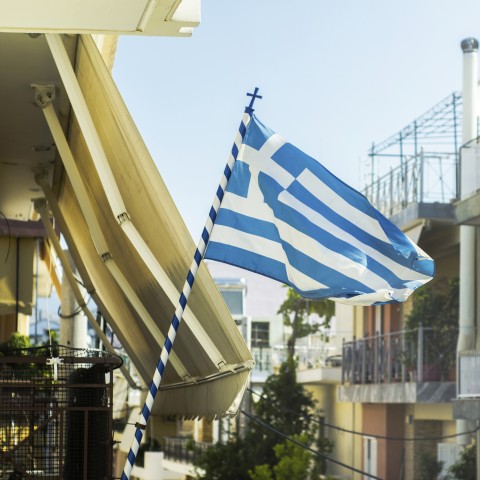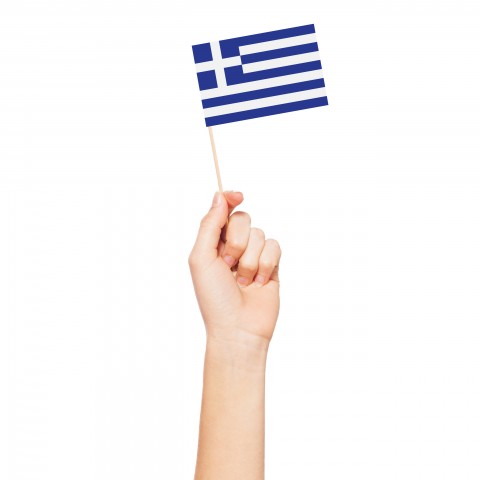
Have you ever heard Ύμνος εις την Ελευθερίαν (Ímnos is tin Eleftherían) – “Hymn to Liberty,” the Greek national anthem? The music is beautiful yet imposing. However, the lyrics might seem a bit complicated to anyone learning Greek, regardless of their level, since they are full of old-fashioned words and phrases which aren’t used in modern Greek anymore.
This is mainly because the poem that later became the lyrics of the Greek national anthem was written in Katharevousa, an older form of Greek used from the 18th to the 20th century. Katharevousa was formed as a compromise between ancient Greek and the vernacular language that most people used during these days, called Demotic Greek. Even today, various phrases of Katharevousa have survived and are used mainly in literature, official documents, and poetry.
Don’t worry, though. We’ve tried to break it down for you as much as possible so that you can understand each verse.
In this article, we will discuss the history of the Greek national anthem. Then, we’ll take a closer look at its lyrics and their translation in English. We will also reference the occasions when the Greek national anthem is played and used, and last but not least, we learn that another country also uses the same national anthem. Can you guess which one?
 Table of Contents
Table of Contents
- The History of the Greek National Anthem
- Lyrics with Romanization & Translation
- Occasions When It Is Played & Heard
- Other Countries Using the Same National Anthem
- How Can GreekPod101.com Help You Learn Greek
1. The History of the Greek National Anthem

The National Anthem of Greece consists of the first stanzas of the poem Ύμνος εις την Ελευθερίαν (Ímnos is tin Eleftherían) – “Hymn to Liberty.” This is quite a long poem, written in May 1823 in Zakynthos by Dionysios Solomos, the so-called national poet of Greece. However, he wasn’t called like that only because he wrote the poem that became the National Anthem of Greece but also because of his rich poetic contribution to Greek culture and the preservation of earlier poetic tradition.
Originally, the poem consisted of 158 stanzas, with the first 24 constituting the National Greek Anthem. However, later, only the first two stanzas prevailed. In spite of that, the Greek national anthem is known as the longest national anthem in the world.
It was set to music by Nikolaos Mantzaros, and approximately forty years later, in 1865, it was eventually adopted as the Greek National Anthem. The music composed by N. Mantzaros integrated folk music elements and was intended for a four-voice male choir.
Regarding the meaning of the poem, Solomos was inspired by the Greek War of Independence and wrote it to honor the brave Greeks who struggled for independence after 400 years of Ottoman rule. This hymn narrates the oppression of the Greeks under the Ottomans and their hope and struggles for freedom. It’s an ode to bravery and patriotism, which manages to pass down this sentiment to all the Greeks worldwide.
Nevertheless, its establishment as the Greek National Anthem didn’t come without struggle. Since both Solomos and Mantzaros were residing in the Ionian islands, it quickly became a revolutionary anthem in this part of Greece. In 1844, N. Mantzaros submitted an early version of the piece to King Otto of Greece, who awarded both D. Solomos and N. Mantzaros with honorary titles. However, he didn’t embrace it as the National Anthem.
That moment came later, in 1865, when King George I visited Corfu after the integration of the Ionian islands with Greece. During the ceremony, he heard a version of the piece by the Corfu Philharmonic Society, and he was so impressed that he issued a royal decree which acknowledged it as the National Anthem. Ιt was ordered to be performed “by all the naval formations of the Royal Navy.” The foreign ambassadors were also informed so that it could be played by foreign ships on occasions when they paid tribute to the King of Greece or the Greek flag.
Today, it’s the official National Greek Anthem and it is used on a variety of occasions, as we will see later in this article.
2. Lyrics with Romanization & Translation

Now, let’s take a look at the lyrics. In the table below, you will find the original Greek lyrics, along with their romanization and a literal translation in modern English.
In that way, you will be able to learn and understand the meaning of the anthem, although it might seem a bit complex from the first sight. Take your time studying each verse and then practice saying the anthem out loud, ideally only focusing on the first column, indicated with blue color.
Ύμνος εις την Ελευθερίαν (Ímnos is tin Eleftherían) – “Hymn to LIberty”
| Greek | Romanization | Literal translation in modern English | |
| 1 | Σε γνωρίζω από την κόψη | Se gnorízo apó tin kópsi | “I know you from the cutting edge” |
| 2 | του σπαθιού την τρομερή | tu spathiú tin tromerí | “(that is) mighty (the edge) of the sword.” |
| 3 | σε γνωρίζω από την όψη | se gnorízo apó tin ópsi | “I know you from the sight” |
| 4 | που με βια μετράει τη γη. | pu me via metrái ti yi. | “which in haste paces the earth.” |
| 5 | Απ’ τα κόκαλα βγαλμένη | Ap’ ta kókala vgalméni | “Risen from the bones” |
| 6 | των Ελλήνων τα ιερά, | ton Elínon ta ierá, | “the holy (bones) of the Greeks” |
| 7 | και σαν πρώτα ανδρειωμένη | ke san próta andrioméni | “and valiant as before” |
| 8 | χαίρε, ω χαίρε, Ελευθεριά! | hére, o hére, Eleftheriá | “hail, oh hail, Liberty!” |
→ Do you want to get a feel of the music of the Greek National Anthem? Or maybe you want to sing along? Click here to watch a relevant video on YouTube.
3. Occasions When It Is Played & Heard
The Greek national anthem is played and heard on the following occasions:
- On National Holidays before the students or military parade
- At the beginning of sports events, where the Greek national team participates (e.g. football, basketball, etc.)
- During an Olympic medal ceremony, if a Greek athlete wins the gold medal
- During the closing ceremony of the Olympics, as a tribute to the ancient Greek roots of the Games.
- Whenever there’s a Greek flag raising at schools, public buildings, or in the army
At this point, we should note that whenever the Greek National Anthem is played, one should stand at attention as an expression of respect.

4. Other Countries Using the Same National Anthem
Only a handful of countries around the world use the national anthem of another country as their own. And one of those countries is Cyprus.
The Greek national anthem is also used by Cyprus as its national anthem, since 1966. This doesn’t come as a surprise, as Cyprus used to be a Greek territory. Today, many people acknowledge their dual identity (Cypriot nationality and Greek ethnicity) and view the use of the Greek national anthem as a bond to the motherland. However, this is often a point of controversy amongst Cypriots. Others say that they need to find their own identity, thus they shouldn’t use the Greek national anthem and should come up with their own.
5. How Can GreekPod101.com Help You Learn Greek

In this article, we dived into the history of the Greek National Anthem, its lyrics, the occasions when it is played and heard, and its adoption by Cyprus as its national anthem.
Wondering how you can get even more help during your Greek learning process?
GreekPod101.com is an online educational platform, which grants you access to high-quality, practical knowledge about Greek language learning. At GreekPod101.com, we aim to provide you with everything you need to know about the Greek language in a fun and interesting way.
And if you need a bit more help, you can also upgrade to Premium PLUS and take advantage of our MyTeacher program to learn Greek with your own personal teacher, who will answer any questions you might have!
Do you have any questions about the Greek national anthem?
Let us know in the comments below.









